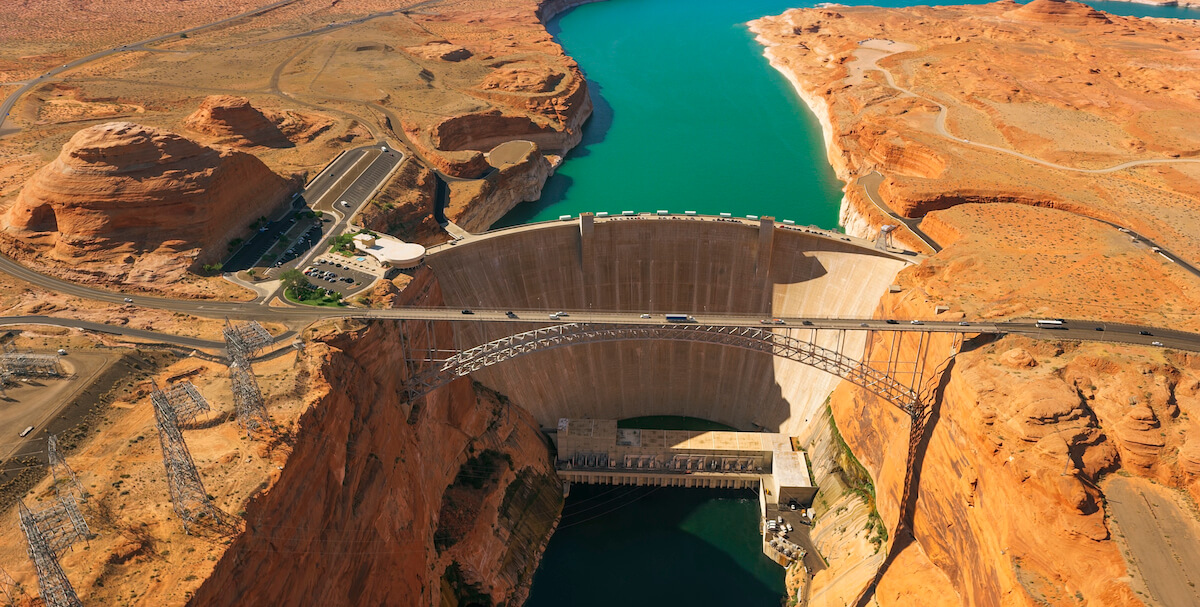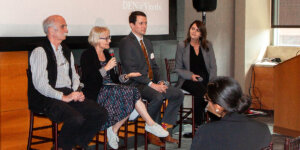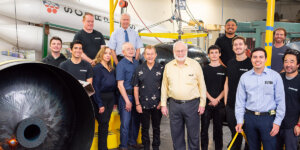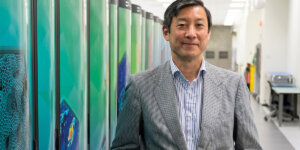
Aerial view of Glen Canyon Dam and Glen Canyon Dam Bridge over Lake Powell, Glen Canyon National Recreation Area, Istock Photo
A novel collaboration among the University of Southern California (USC), the University of Arizona (UA), and the University of Nevada, Reno (UNR), has resulted in the Water Reuse Consortium. This groundbreaking partnership has been awarded a $12.3 million cooperative agreement for phase one of a three-phase $38 million program with ERDC-CERL to tackle pressing water challenges through innovative research, education, communication, and unprecedented collaborative efforts between government, local communities, industry, and academia.
The Water Reuse Consortium brings together the expertise of three leading academic institutions renowned for their contributions to water management and environmental sustainability, and the U.S. Army Corps of Engineers ERDC-CERL. By leveraging their combined knowledge, resources, and engineering expertise, the Consortium seeks to revolutionize water reuse practices and promote sustainable solutions for the benefit of communities, industries, and the environment.
Clean water scarcity is an increasingly critical issue worldwide, and effective water reuse strategies are essential in mitigating its impact. Recognizing this urgent need, the Water Reuse Consortium will focus on research and development initiatives to advance water treatment technologies, enhance the efficiency of water reuse systems, and drive sustainable policies and practices while addressing public health concerns.
The Consortium will undertake interdisciplinary studies, fostering collaboration between faculty members, researchers, and industry leaders across the country. Together, they will explore innovative approaches to water reclamation, purification, and distribution and socioeconomic implications, health concerns, and public acceptance of water reuse strategies.
In addition to research, the Water Reuse Consortium will serve as a platform for education, communication, and knowledge exchange. Through workshops, seminars, media and training programs, the Consortium will educate and empower water professionals, policymakers, and the general public to understand the importance of water reuse and adopt sustainable practices.
As part of its mission, the Consortium will actively engage with industry partners, government agencies, and community stakeholders to address their specific water reuse challenges. By connecting research with real-world applications, the Water Reuse Consortium aims to drive meaningful impact and influence policy decisions that promote the responsible use of clean water resources.
“Potable reuse offers a local clean water supply that can provide local sustainability and water security, especially in a changing climate,” said Amy Childress, a professor of Civil and Environmental Engineering at USC, who will serve at the consortium’s academic lead. “By pooling our resources and expertise, we can make significant strides in advancing sustainable water management practices that will help address ecosystem pressures and assist with cost control for food and energy systems.”
The Water Reuse Consortium invites interested stakeholders, researchers, and organizations to join their efforts in promoting water reuse and shaping the future of sustainable water management. Together, they will strive to create a more water-secure world for generations to come.
At the USC Viterbi School of Engineering:
USC is leading the way in sustainability education, research, and operations that impact our campus community and the world. At the USC Viterbi School of Engineering, a $4.3 million cooperative agreement from the U.S. Army Corps of Engineers, ERDC-CERL will support research, education, and outreach in the new USC ReWater Center (the Water Reuse and Resource Recovery Center). Led by Professor Amy Childress together with professors Adam Smith, Daniel McCurry, Adam Simpson and lecturer and filmmaker Daniel Druhora, it will be dedicated to achieving constituent removals necessary to meet potable reuse regulations, recovering resources from wastewater and residual streams, and reducing energy requirements for sustainable wastewater reclamation, a critical initiative for California whose Central Valley is estimated to grow over half the fruits and vegetables consumed in the United States.
At the University of Arizona (UA):
The University of Arizona is home to the Water and Energy Sustainable Technology (WEST) Center, which brings together academia, the private sector, utilities, and the community at large to innovate and facilitate research into sustainable water supplies. A team of researchers have received a $4 million cooperative agreement from the U.S. Army Corps of Engineers, ERDC-CERL to advance water resiliency and self-sufficiency in the arid Southwest. Principal investigator Andrea Achilli, of chemical and environmental engineering, is collaborating with co-PIs Kerri Hickenbottom, Mohammed Shafae, Eduardo Sáez, Luisa Ikner, Amanda Wilson, James Farrell, and Walter Betancourt to develop methods for decentralizing and automating community water systems, create a more efficient, responsive, adaptive, and sustainable water reuse infrastructure, and develop the next generation of water professionals.
At the University of Nevada, Reno (UNR):
At University of Nevada-Reno, located in the driest state in the United States that holds an estimated 25% of world’s supply of lithium, the College of Engineering has received a $4 million cooperative agreement from the U.S. Army Corps of Engineers, ERDC-CERL to establish the Nevada Center for Water Resiliency. New water treatment technologies, particularly those that focus on potable water (drinking water) reuse from a variety of water sources, will be tested at the center. Overseen by Professors Sage Hiibel and Eric Marchand, the center will house research projects in four areas: advanced water reuse technologies, emerging contaminants, alternative water sources and resource recovery. In addition to Hiibel and Marchand, UNR engineering faculty involved in the center are Keith Dennett, David Hanigan, Rashed Khan, Krishna Pagilla and Victor Vasquez.
At the U.S. Army Corps of Engineers ERDC-CERL:
The U.S. Army Corps of Engineers ERDC-CERL has awarded cooperative agreements to University of Southern California (USC), the University of Arizona (UA), and the University of Nevada, Reno (UNR). Dr. Dawn Morrison will lead an ERDC-CERL team, which includes Kathryn Gunderson, Steve Cosper, Elizabeth Gao, Kylie Burkett, Matthew Hiett, Andy Hur, Martin Page, Kathryn Guy and Nicholas Josefik, to research advanced water reuse and treatment technologies, alternative water sources, resource recovery, and water resiliency for application across the Department of Defense. ERDC is the premier research and development center for the U.S. Army Corps of Engineers. CERL, one of seven labs within ERDC, discovers, develops, delivers, and sustains trusted engineering and scientific solutions impacting built and natural infrastructure for the warfighter and the Nation.
To learn more about this new consortium, watch this week’s episode of the The Circuit, an engineering show created by USC Viterbi in conjunction with the NAE:
Published on June 8th, 2023
Last updated on June 8th, 2023













